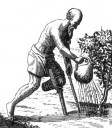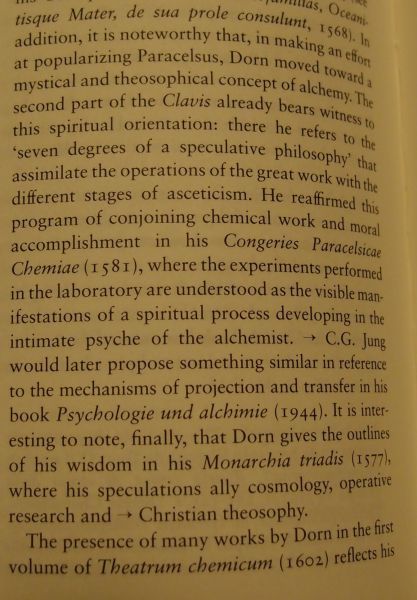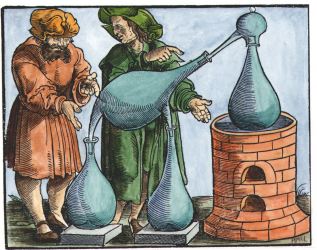| Author | Post |
|---|
Rafal T. Prinke
Member

| Joined: | Tue Mar 4th, 2008 |
| Location: | Poland |
| Posts: | 150 |
| Status: |
Offline
|
|
Posted: Sat Dec 22nd, 2012 12:04 am |
|
Adam writes in his advertisement of Paul's translation of Gerhard Dorn's Philosophia speculativa that he "could find little to confirm the Jungian view of the work". I have just found in the entry on Dorn in Brill's Dictionary of Gnosis..., authored by Frank Greiner, a suggestion that it was a later work Congeries Paracelsicae Chemiae (1581) where "the experiments performed in the laboratory are understood as the visible manifestations of a spiritual process developing in the intimate psyche of the alchemist" and this was the inspiration for Jung. In the latter's Psychology and alchemy the Congeries is quoted just twice but without clear reference to that parallel. Is the question perhaps discussed in any "post-Jungian" or "anti-Jungian" publications?
|
Tom Willard
Member

| Joined: | Mon May 5th, 2008 |
| Location: | Tucson, Arizona USA |
| Posts: | 96 |
| Status: |
Offline
|
|
Posted: Sat Dec 22nd, 2012 05:51 am |
|
See Thomas Willard, "The Star in Man: C. G. Jung and Marie-Louise von Franz on the Alchemical Philosophy of Gerard Dorn," Gutes Leben und Guter Tod von Spätantike bis zur Gegenwart (Berlin and New York: de Gruyter, 2012), 425-61.
(http://www.academia.edu/1611193/_The_Star_in_Man_C._G._Jung_and_Marie-Louise_von_Franz_on_the_Alchemical_Philosophy_of_Gerard_Dorn_)
|
Paul Ferguson
Member

| Joined: | Fri Feb 15th, 2008 |
| Location: | |
| Posts: | 1538 |
| Status: |
Offline
|
|
Posted: Sat Dec 22nd, 2012 08:59 am |
|
Tom Willard wrote:
See Thomas Willard, "The Star in Man: C. G. Jung and Marie-Louise von Franz on the Alchemical Philosophy of Gerard Dorn," Gutes Leben und Guter Tod von Spätantike bis zur Gegenwart (Berlin and New York: de Gruyter, 2012), 425-61.
(http://www.academia.edu/1611193/_The_Star_in_Man_C._G._Jung_and_Marie-Louise_von_Franz_on_the_Alchemical_Philosophy_of_Gerard_Dorn_)
Is there any evidence that Jung was aware of the 16th century German translation of the Speculativa Philosophia?
|
Tom Willard
Member

| Joined: | Mon May 5th, 2008 |
| Location: | Tucson, Arizona USA |
| Posts: | 96 |
| Status: |
Offline
|
|
Posted: Sat Dec 22nd, 2012 11:27 am |
|
| I found no evidence that Jung knew the "Schüssel der Chimistlichen Philosophy" (1602). Indeed, he tends to call Dorn a seventeenth-century figure--perhaps because the texts appear in volume 1 of Zetzner's "Theatrum Chemicum", first printed that year. Last edited on Sat Dec 22nd, 2012 11:28 am by Tom Willard
|
Rafal T. Prinke
Member

| Joined: | Tue Mar 4th, 2008 |
| Location: | Poland |
| Posts: | 150 |
| Status: |
Offline
|
|
Posted: Sat Dec 22nd, 2012 12:39 pm |
|
Thank you, Tom, for this excellent article - I have read it with much interest and find it informative on both Dorn and Jung/von Franz (and especially the latter's use of the former's concepts). It is, however, mostly centered on Philosophia specultativa, Dorn's early work which, as you know from Didier Kahn's article you refer to, was originally pre-Paracelsian and only re-worked for publication after Dorn met von Bodenstein. Frank Greiner clearly refers to the much later Congeries as Jung's source or inspiration, and apparently the text where Dorn states that material changes in the laboratory are parallel to or reflections of the spiritual process within the *psyche* (Greiner's word) of the alchemist. As far as I understand Jung's approach, this is not exactly the same, because he treated the symbolic language of alchemy as a result of the projection of the unconscious on the substances worked upon, while Dorn (if I am not "projecting" my own unconscious on Greiner's short statement) saw both processes to be parallel. The Congeries is available in both Theatrum chemicum and Manget -- but "my Latin" is not good enough to even locate the place which may relate to Greiner's statement.
I have now checked Jung's Mysterium coniunctionis (1955-56) and find that unlike in Psychology and alchemy (1944), here he quotes Dorn very frequently -- too frequently to check all the index entries easily! So perhaps his attitude to Dorn also evolved?
BTW: On top of p. 432, is the year 1543 a typo for 1541 (death of Paracelsus)?
|
Paul Ferguson
Member

| Joined: | Fri Feb 15th, 2008 |
| Location: | |
| Posts: | 1538 |
| Status: |
Offline
|
|
Posted: Sat Dec 22nd, 2012 02:29 pm |
|
I've had a very quick look through the Congeries and I can't see anything that would support such an argument. It seems a standard work of physical alchemy typical of the time.
Doesn't Greiner supply a reference in his article?
|
Rafal T. Prinke
Member

| Joined: | Tue Mar 4th, 2008 |
| Location: | Poland |
| Posts: | 150 |
| Status: |
Offline
|
|
Posted: Sat Dec 22nd, 2012 03:29 pm |
|
Hi, Paul. Thank you for having a look at the Congeries -- and hope the question is of more general interest, not just my curiosity.
Unfortunately, Frank Greiner's article is an encyclopedia entry so does not provide precise references. The bibliography at the end just lists titles of Dorn's works and relevant literature. There is nothing by Greiner himself there and I do not think he published anything specifically on Dorn -- which is confirmed in Tom's paper where he says that the best study to date is Didier Kahn's article on Clavis. Besides that there was only a very short paper by Jean-François Marquet on Dorn's philosophy and Didier Kahn's expanded restatement in his large volume Alchimie et paracelsisme. As far as I could find out, this is practically all of the non-Jungian scholarship on Dorn (plus the bibliography by Alfred Ribi quoted by Tom and his earlier article refered to in the last footnote).
To be precise, I enclose a picture of the relevant fragment from Frank Greiner's entry in Wouter J. Hanegraaff et al. (ed.), Dictionary of Gnosis & Western Esotericism, Brill 2006 (sorry for the quality!):
Attached Image (viewed 1795 times):

|
Tom Willard
Member

| Joined: | Mon May 5th, 2008 |
| Location: | Tucson, Arizona USA |
| Posts: | 96 |
| Status: |
Offline
|
|
Posted: Sat Dec 22nd, 2012 04:39 pm |
|
Like Paul, I can't see why Dorn's "Congeries" could have been so important for Jung. The proof text Jung liked to quote is from "The Speculative Philosophy": "Transform yourselves into living philosophical stones" (translation from "Psychology and Alchemy," 148). Moreover, the important concept from Dorn in "Mysterium Coniunctionis"--that of the "unus mundus" (one world, incorporating the subject and object, the known and unknown) is also from "The Speculative Philosophy," which, as you will have seen, is quoted repeatedly there.
"The Speculative Philosophy" is the second half of Dorn's first published book: "The Key to the Alchemyistical Philosophy,"later translated into German, as Paul notes. The second half was written after Dorn had encountered the ideas of Paracelsus, as Dorn states in the preface.
Jung did make use of Dorn's commentary on Paracelsus "De vita long" (1583) in his essay on "Paracelsus as a Spiritual Phenomenon," where he connects some terms and concepts of Paracelsus to his own psychological types. For more details on this see my earlier essay "Living the Long Life," Religion und Gesundheit der Heilkundliche Diskurs im 16. Jahrhundert (Berlin and New York: de Gruyter, 2011), 347-80.
http://www.academia.edu/1075498/_Living_the_Long_Life_Physical_and_Spiritual_Health_in_Two_Early_Paracelsian_Tracts_Last edited on Sat Dec 22nd, 2012 05:00 pm by Tom Willard
|
Paul Ferguson
Member

| Joined: | Fri Feb 15th, 2008 |
| Location: | |
| Posts: | 1538 |
| Status: |
Offline
|
|
Posted: Sun Dec 23rd, 2012 06:07 pm |
|
I have had another look at the Congeries. I suppose passages in the Dedication such as the following (pages 12 - 13 of the Google Book version) could be seen as lending weight to what Greiner is on about:
'Versatur enim ars spagirica Chimicorum in invisibilis naturae, spiritu et anima videlicet; quo fit ut a corporum cultoribus Physicis nullatenus percipi queat occultum sub manifesto centrum, nec intervallum, tantisper dum in superficie haesitarit oculus eorum sub privatione vel carentia lucis.'
which I take to mean something like:
'For the Spagyric Art of the Alchemists is focused on the invisible things in nature, namely the spirit and the soul, from which it results that the cultivators of bodies, the Physicists, can in no way perceive the centre that is hidden beneath the manifest, nor the interval between the centre and the surface of things, for as long their gaze is rigidly attached to that surface due to a deprivation or lack of insight.'
|
Tom Willard
Member

| Joined: | Mon May 5th, 2008 |
| Location: | Tucson, Arizona USA |
| Posts: | 96 |
| Status: |
Offline
|
|
Posted: Sun Dec 23rd, 2012 06:54 pm |
|
Allusion to Rom. 1.20?
"Invisibilia enim ipsius, a creatura mundi, per ea quae facta sunt, intellecta, conspiciuntur . . . ." (For the invisible things of him from the creation of the world are clearly seen, being understood by the things that are made . . . .")
Another passages from the "Congeries" that came to mind, but didn't seem entirely relevant to Greiner's claims is chapter 6 of "De Transmutatione Metallorum" (the first tract in the "Congeries"): The chapter has the caption "De subjecto vel materia philosophic in genera" and has much to say about Mercury. Although it does not address the subject-object split (Blake's "cloven fiction" and the philosophical problem behind's Jung projection and introjection, it does cite Paracelsus on the matter within the human body.
|
Rafal T. Prinke
Member

| Joined: | Tue Mar 4th, 2008 |
| Location: | Poland |
| Posts: | 150 |
| Status: |
Offline
|
|
Posted: Sun Dec 23rd, 2012 10:52 pm |
|
Many thanks to Paul and Tom for the quotations. As you note, these require much "streching" to justify Frank Greiner's statement. I thought of him as the editor of the "Aspects de la tradition alchimique" volume of papers and specialist on baroque alchemists (translator and editor of Pierre Jean Fabre's Alchimiste Chrétien) but as I don't read French, I did not know what his approach was. I see his background is in the history of literature (which used to be and sometimes still is susceptible to Jungian ideas -- and I have now found his video-lecture on Jung's alchemy:
http://www.archivesaudiovisuelles.fr/FR/_video.asp?id=2146&ress=7092&video=140154&format=68
I may be wrong, but maybe favourable attitude toward Jung may make one "project" such reading on a text that is far from clear and obvious? There is certainly nothing wrong about it, in my opinion, as long as it is "soft-Jungian" -- and besides, any of us (or other histrians/interpreters of alchemy) has his/her predefined (often unconscious) perspective. I am just trying to see the arguments which may justify the statement about the material processes as visible manifestations of spiritual progress.
|
Tom Willard
Member

| Joined: | Mon May 5th, 2008 |
| Location: | Tucson, Arizona USA |
| Posts: | 96 |
| Status: |
Offline
|
|
Posted: Mon Dec 24th, 2012 12:10 am |
|
Thanks for the link, Rafal!
I like the term "soft Jungian" and suppose I should say, "C'est moi." Of course I recognize that Jung and von Franz are allegorical readers of alchemical texts, as much as A. E. Waite or Mary Anne South, if not more, but they are close readers too and have pointed up many interesting parallels. I especially like the study of the "Bologna Enigma" (Aelia Laelia Crispis) first published in Ambix and included in "Mysterium Coniunctionis."
The odd thing to me is Jung's curious blindness to his own allegorizing and his resistance to the allegorizing in what Greiner calls Baroque alchemy--notably the Rosicrucian-inspired texts, which I think he calls "dangerous" in one place at least.
|
Paul Ferguson
Member

| Joined: | Fri Feb 15th, 2008 |
| Location: | |
| Posts: | 1538 |
| Status: |
Offline
|
|
Posted: Mon Dec 24th, 2012 09:16 am |
|
So, if I understand this correctly, using Rafał's terminology:
Soft: physical-alchemical processes are analogous to certain psychological processes but they are entirely independent of each other.
Intermediate: physical-alchemical processes are a reflection of certain psychological processes.
Hard: physical-alchemical processes and certain psychological processes are in a close causative interrelationship.
Greiner seems to me to be arguing for Hard when Dorn is arguing for Intermediate.
|
Rafal T. Prinke
Member

| Joined: | Tue Mar 4th, 2008 |
| Location: | Poland |
| Posts: | 150 |
| Status: |
Offline
|
|
Posted: Mon Dec 24th, 2012 12:22 pm |
|
Tom writes:
"The odd thing to me is Jung's curious blindness to his own allegorizing"
I think this really captures the essence of why people turned away from Jung. He certainly had a lot of important observations about the language of alchemical texts and their symbolic content -- but insisting, as he does, that all those texts and imgages describe the process of individuation is something I cannot buy, while it is his key motif (if my understanding of Jung is correct).
|
Rafal T. Prinke
Member

| Joined: | Tue Mar 4th, 2008 |
| Location: | Poland |
| Posts: | 150 |
| Status: |
Offline
|
|
Posted: Mon Dec 24th, 2012 12:39 pm |
|
Paul writes:
"Greiner seems to me to be arguing for Hard when Dorn is arguing for Intermediate."
At least on the basis of the quote I sent, Greiner does seem to be arguing for Hard in your scheme. But actually I meant not the relationship between the chemical processes and psychological states (which in itself is Jungian, so we cannot say that Dorn is somewhere in it, and we also can't equte his understanding of spiritual development with Jung's psychological process, IMHO).
What I meant was rather that in this quotation Frank Greiner (and hosts of others) seems to be interpreting Dorn in a way similar to Dorn's interpretation of Greek myths -- they both see something in those texts which is not obvious unless you are certain it must be there. So my definition of "hard-Jungian" approach would be: one which presupposes/assumes alchemy describes Jungian ideas and just intends to find them in texts/images. The "soft-Jungian" approach would be to use aspects of Jung's work and his individual observations without accepting his "metanarration" but also without feeling guilty when quoting from Jung (as many historians of alchemy seem to feel).
|

Current time is 09:36 am | Page: 1 2   |
|

